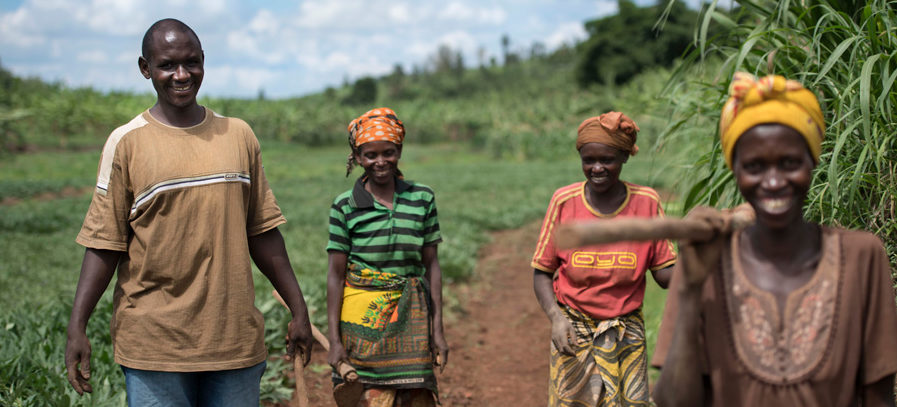The Forest and Farm Facility (FFF) was launched in 2012 with the goal to strengthen international support to forest and farm producer organizations (FFPOs). Now, FFF is ready to scale up.
In its second phase the Facility will focus on raising capacity of forest and farmer producer organizations through direct financial support and technical assistance, as well as by providing special attention to gender equality, youth and the rights of indigenous peoples.
The Facility will support producers by helping them to organize, connect to each other and develop new business opportunities. Cross-sectorial coordination is central to the work of the Facility, with an approach to improve livelihoods through access to market and by improving the ability of forest and farmer producer organizations to negotiate better prices and leverage their financial resources more effectively. The Facility will also provide support in terms of policy changes and tenure security.
According to FAO, the first phase which ran from 2012 to 2017 directly contributed to at least 26 significant policy changes. For example, a new law in Guatemala secures one percent of the national budget over 30 years for restoration work, primarily targeting small-scale producers. In Myanmar, a new Community Forestry Instruction allows smallholder producers to manage forests for commercial purposes.
The work of the Facility has proven both demand-driven and cost-effective and brought positive impact for more than 950 forest and farmer producer organizations in 10 partner countries, where the first phase was rolled out. These strong results clearly demonstrated that there is a demand for the second phase.
FFF phase II: business savvy farmers, resilient landscapes, improved livelihoods
The second phase of the Forest and Farm Facility was recently launched and will run from 2018 to 2022. During this period, the direct support to producer organizations will be expanded from the 10 countries targeted during the initial stage to 25 countries across Asia, Latin America and Africa.
The second phase is a partnership between FAO, International Institute for Environment and Development (IIED), International Union for Conservation of Nature (IUCN) and AgriCord.
FFF is closely linked to the 2030 Agenda and the Sustainable Development Goals (SDGs). The objectives of the second phase focus on: inclusive governance and cross-sectorial partnerships centered around enabling policies (SDGs 16, 17); entrepreneurship, access to markets and finance through equitable value chains within FFPOs (SDGs 1, 5, 8, 12); support mitigation, adaptation and resilience to climate change on a landscape scale through e.g. improved environmental technical knowledge (SDGs 2, 13, 15), and equitable access to social and cultural services (SDGs 3,10).
The initiative aims to improve the gender and youth balance and representation in policy processes by supporting the integration of small-scale producers in politics. Experience from the first phase shown rural development in forestry and farm communities is more sustainable when there is attention and support to gender equality and women’s entrepreneurship. In phase two FFF will be on guard for these values and ensure social equity is mainstreamed in climate and social resilience aspects of the Facility’s work.
The second phase is also well aligned with the United Nations Strategic Plan for Forests 2017–2030 (UN SPF). The facility aims to showcase the role of forests and trees in achieving many of the goals of the 2030 Agenda and highlight the importance non-wood forest products have for the livelihoods of small scale producers.
Why FFPOs?
There are about 1.5 billion smallholder forest and farm producers globally, making up nearly a quarter of the world’s population. About 90 percent of those producers depend on nearby forests or trees growing on their farms for their livelihood needs and income. These farms are important sources of food and non-wood forest products, as well as timber and fuelwood. The interlinkages between forestry and agriculture are perfect examples of the need for cross-sector initiatives paramount for the realization of the 2030 Agenda.
On their own, small-scale forest and farm producers have very limited opportunities to negotiate the best prices for their produce because of limited access to market information, skills to interpret it and decision-making processes to claim rights and social benefits. In a producer organization, individual farms can come together and use the collective size of their combined production as a powerful economic force. By joining together, the farmers also increase their potential to influence policy makers.
“By targeting forest and farmer producer organizations instead of individual farmers, we can reach out to more people and initiate knowledge sharing and collaboration, while improving production efficiency and building economies of scale. FFPOs also provide a holistic perspective and can serve as a gate to integration with other sectors, like wildlife,” said Ignatius Makumba, Director of Forestry, Zambia.
FFPOs as key agents of change
In Sweden, forest and farm producer organizations hold a strong position in governance and policy-making, both today and historically. The Forest and Farm Facility is also a strategic priority area for Sida’s (Swedish International Development Cooperation Agency) contribution to FAO.
“We believe that FFF has strong potential to create and deliver value for the people and therefore act as an agent of change. It is easier to tap into resources, such as funding and technical support, if you are a part of an organized entity,” said Emilie Molin, Head of section for the Division of forest and climate at the Swedish Ministry of Enterprise and Innovation during the During the launch of the second phase of the Facility.
“Forest and farmers producer organizations are really at the heart of our work to unlock the potential of FAO’s support to countries in achieving the SDGs,” pointed out Daniel Gustafson, FAO Deputy Director-General Operations.
Check out this publication to learn more about the work of the Forest and Farm Facility!
